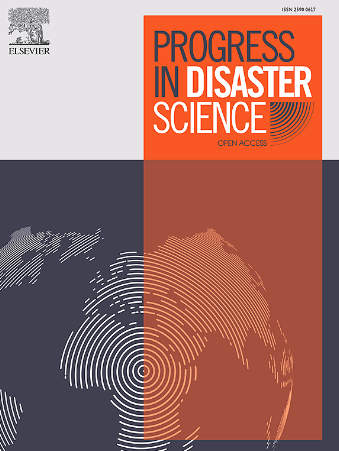博弈论在管理利益相关者冲突中的应用,以建立安全和抵御自然灾害的能力
IF 3.8
Q3 ENVIRONMENTAL SCIENCES
引用次数: 0
摘要
建筑物和住房的安全性和抵御自然灾害的能力,作为城市的一个关键要素,对可持续发展至关重要。确保建筑物和社区在面对灾害时的安全性和复原力是一个复杂和多方面的现象。这一挑战不仅涉及各种经济、社会、工程和法律层面,而且还需要具有不同利益和目标的不同利益相关者的合作。然而,相关参与者和利益攸关方之间的冲突可能阻碍进展,危及建设安全和复原力的目标,最终威胁到社区的可持续性。住房安全和弹性系统的管理需要对利益相关者的行为和他们之间的冲突有深刻的理解。即使当利益相关者寻求共同利益时,他们的行为有时也会导致所有相关方的次优结果。博弈论为检查和解释与建筑物和住房的安全性和弹性相关的利益相关者的行为提供了一个分析框架。它强调了不同各方之间的相互作用是如何影响系统的演变和结果的,这些各方可能优先考虑个人目标而不是更广泛的系统目标。通过博弈论获得的结果通常与优化方法提出的结果形成对比,优化方法通常假设所有各方在实现整个系统的最佳可能结果的承诺方面完全一致。本研究探讨了应用博弈论来分析城市住房建设过程中关键行为者的行为,识别存在的冲突,并探讨它们对面临自然灾害的发展中国家建筑物的恢复力和安全性的影响。通过分析安全和弹性挑战的动态和复杂结构,该研究强调了在解决这些问题时考虑利益相关者态度和游戏进化轨迹的重要性。此外,它还引入了工程师和投资者之间的游戏,以展示参与各方的个人目标如何促进机会主义行为,从而损害建筑物的安全性和弹性。最后,该研究认为博弈论可以作为理解利益相关者行为、解决冲突和加强利益相关者之间合作的有效工具。这种方法为旨在实现更安全、更有弹性的城市系统的政策制定者提供了宝贵的见解。本文章由计算机程序翻译,如有差异,请以英文原文为准。
Game theory applications in managing stakeholder conflicts for building safety and resilience against natural disasters
The safety and resilience of buildings and housing against natural disasters, as a key urban element, are vital for sustainable development. Ensuring the safety and resilience of buildings and communities in the face of disasters is a complex and multidimensional phenomenon. This challenge not only encompasses various economic, social, engineering, and legal dimensions but also requires the collaboration of diverse stakeholders with differing interests and objectives. However, conflicts between relevant players and stakeholders can hinder progress and jeopardize the goal of building safety and resilience, ultimately threatening the sustainability of communities. The management of housing safety and resilience systems requires a deep understanding of stakeholder behavior and conflicts among them. Even when stakeholders seek mutual benefits, their actions can sometimes lead to suboptimal outcomes for all involved parties. Game theory provides an analytical framework for examining and interpreting the actions of stakeholders related to the safety and resilience of buildings and housing. It highlights how interactions among different parties, who may prioritize personal goals over broader system objectives, can influence the system's evolution and outcomes. The outcomes obtained through game theory often contrast with those proposed by optimization approaches, which typically assume that all parties are fully aligned in their commitment to achieving the best possible outcome for the system as a whole. The present study examines the application of game theory to analyze the behavior of key actors involved in the urban housing construction process, identify existing conflicts, and explore their impact on the resilience and safety of buildings in developing countries facing natural disasters. By analyzing the dynamic and complex structure of safety and resilience challenges, the study underscores the importance of considering stakeholder attitudes and the game's evolutionary trajectory in addressing these issues. Furthermore, it introduces a game between engineers and investors to demonstrate how the personal goals of involved parties can foster opportunistic behaviors that compromise the safety and resilience of buildings. Ultimately, the study argues that game theory can serve as an effective tool for understanding stakeholder behavior, addressing conflicts, and enhancing collaboration among stakeholders. This approach offers valuable insights for policymakers aiming to achieve safer and more resilient urban systems.
求助全文
通过发布文献求助,成功后即可免费获取论文全文。
去求助
来源期刊

Progress in Disaster Science
Social Sciences-Safety Research
CiteScore
14.60
自引率
3.20%
发文量
51
审稿时长
12 weeks
期刊介绍:
Progress in Disaster Science is a Gold Open Access journal focusing on integrating research and policy in disaster research, and publishes original research papers and invited viewpoint articles on disaster risk reduction; response; emergency management and recovery.
A key part of the Journal's Publication output will see key experts invited to assess and comment on the current trends in disaster research, as well as highlight key papers.
 求助内容:
求助内容: 应助结果提醒方式:
应助结果提醒方式:


